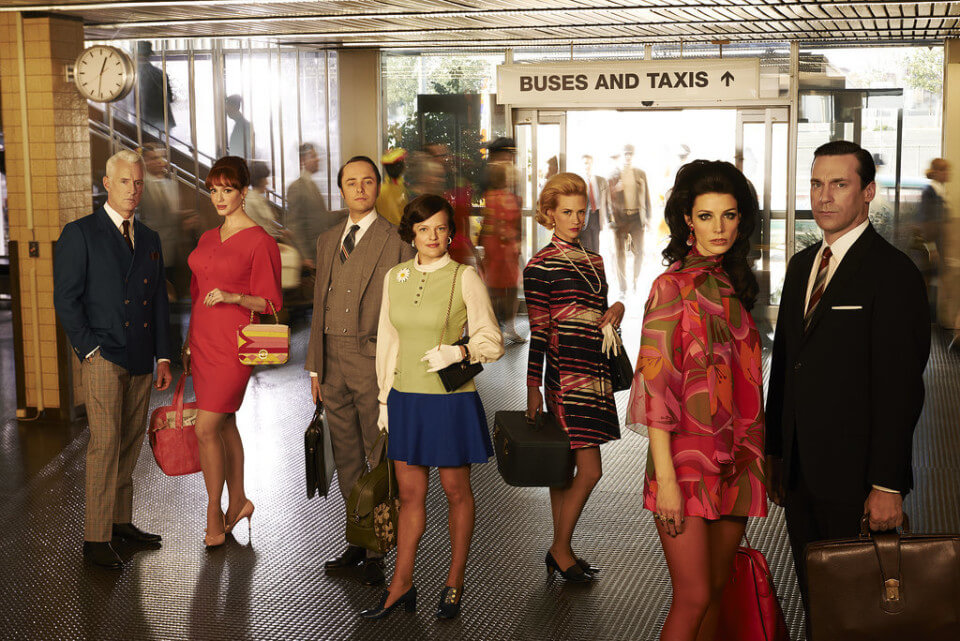Ricochet is the best place on the internet to discuss the issues of the day, either through commenting on posts or writing your own for our active and dynamic community in a fully moderated environment. In addition, the Ricochet Audio Network offers over 50 original podcasts with new episodes released every day.
 Mad Men, the 1960s, and “Free” Love
Mad Men, the 1960s, and “Free” Love
 I’ve looked at the 1960s from both sides now — through my own eyes and through the vision of Matthew Weiner’s epic drama of that decade, Mad Men, which returns for its final episodes on Easter Sunday, April 5. In Mad Men time, it is 1969. The massive publicity campaign has the perfect tag line, of course: “the end of an era.”
I’ve looked at the 1960s from both sides now — through my own eyes and through the vision of Matthew Weiner’s epic drama of that decade, Mad Men, which returns for its final episodes on Easter Sunday, April 5. In Mad Men time, it is 1969. The massive publicity campaign has the perfect tag line, of course: “the end of an era.”
Previously on Mad Men, man walked on the moon and agency founder Bert Cooper (played by Robert Morse, he of the 1960s Broadway smash How to Succeed in Business Without Really Trying) uttered a “bravo” to Neil Armstrong’s own timeless tag line and passed away. Then Cooper, an Ayn Rand afficionado, returned in a season-ending fantasy sequence with a final bit of wisdom for Don Draper: the best things in life are free.
Donald Draper never believed that. He’s self-made — self-reinvented, really — and he’s as aggressive in pursuit of business opportunities as he is in pursuit of romantic conquests. And conquests, they are. In the series premiere, set in 1960, Draper memorably told his then girlfriend Rachel Menkin:
“The reason you haven’t felt it is because it doesn’t exist. What you call love was invented by guys like me, to sell nylons. You’re born alone and you die alone and this world just drops a bunch of rules on top of you to make you forget those facts. But I never forget. I’m living like there’s no tomorrow, because there isn’t one.”
By 1969 Draper had been through two unsuccessful marriages and many affairs of all types, from passionate to casual, risky to just frisky, with everyone from pioneering professional women to women working in the oldest of professions. Many of his dalliances — and many of Mad Men‘s other sexual relationships — are of the type that came to be know during that decade as “free love.”
Free love meant consensual sex free from the responsibilities of marriage, family, and its toils, tolls, and troubles. It always existed, but was greatly facilitated by the arrival of the birth control pill in 1959.
Mad Men has the good sense to show the growth of the free love culture in the 1960s without talking about it directly. We see it in glances and attitudes, with consequences intact. Love-starved careerist Peggy Olson is willfully blind to her own pregnancy in the first season. Draper discharges sexually charged imagery into the culture, then prevents his young daughter from wearing make-up and go-go boots to a party (though he can’t prevent what she sees there). Don’s business partner, Roger Sterling, and his ex-wife Mona struggle (so far in vain) to retrieve their own daughter, a young mom, from a commune.
Entering the final seven episodes, there’s much uncertainty as to which Mad Men characters will find redemption, particularly in the domain of romantic and sexual relationships. The female characters are certainly awakening, as was the case in 1969, to the oppressive nature of the old sexual order. Some made bold choices.
Joan Holloway, an unmarried beauty, backed away from an abortion at the last minute. Stuck at home with a child and a hovering mother, she traded a sexual favor for a lucrative partnership and troubles to be named latter: a compromised relationship with mammon, and the jealous, condescending glances from colleagues who know what she did.
Peggy Olson ascended the corporate ladder, and passed a morose 30th birthday. Don Draper reassured her that, while he worried about a lot of things, he didn’t worry about her. Peggy was doing just fine. Peggy wept briefly, then had a creative breakthrough. We love Peggy. We see much good in Don for finally pushing her into finding her own way as a creative leader. But we wonder if she’ll do better than he has in romance.
All the answers shouldn’t be expected in the final episodes. The ramifications of the sexual revolution and the other 1960s changes raised in Mad Men haven’t even been answered now, 45 years later. Or have they?
Published in General



Conflict is what makes the story interesting. Don is best when he’s unapologetically bad. Roger is great because he constantly leaves everything of true value behind as he wades through the naked bodies. Peggy will become Don, her mentor. Be good or be bad but don’t be wishy washy. It’s hard to develop characters when the viewer forgets the nuances over the long breaks between seasons.
Plus, beatniks are more interesting than hippies.
Last season started slow but finished strong. I hope they get up to speed quickly.